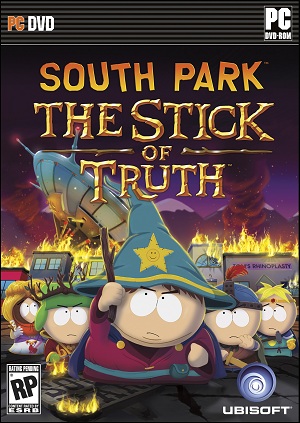 PLATFORM: Playstation 3, Xbox 360, PC (Reviewed)
PLATFORM: Playstation 3, Xbox 360, PC (Reviewed)
PRICE: $59.99 (Consoles), $54.95 (PC)
ESRB RATING: M
DEVELOPER: Obsidian Entertainment
PUBLISHER: Ubisoft
BUY IT FROM AMAZON: Here!
BUY IT FROM STEAM: Here!
South Park and videogames have a long and ugly history together. Many attempts have been made to successfully adapt the show into game form, to various degrees of failure (The most recent until now being the XBLA releases Let’s Go Tower Defence Play! and Tenorman’s Revenge). Attempting to squeeze the charm of the show into whatever genre was most marketable at the time (Kart racer, FPS and quiz game among them), these games have been little more than product, with bland-to-poor gameplay and none of the wit or authorial voice of the source material.
So, when THQ announced that show creators Trey Parker and Matt Stone were working on a South Park game with RPG veterans Obsidian, with Parker and Stone reportedly pitching the game directly to the developer, it sent ripples of excitement among the gaming community, particularly among South Park fans who had seen the show treated so poorly so many times in their medium. It all sounded almost too good to be true.
Then the game was delayed, and THQ collapsed. Though The Stick of Truth‘s limbo was short, being picked up by Ubisoft in short order, a string of further delays and an extended news drought had some doubting the state in which the game would be released whenever it actually did see the light of day. Thankfully, however, a release date finally stuck: The Stick of Truth is finished and is about to hit the screens of eager South Park fans across the globe. The question is: is it worth the wait?
It is my genuine pleasure to answer that one with a gargantuan, resounding brown-note of a ‘yes’. The Stick of Truth is not only the best South Park game, but the most fun I’ve had with any RPG in quite some time.
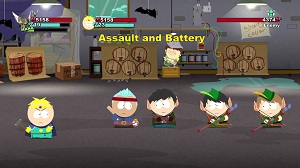 The game basically picks up where this season’s ‘Black Friday’ three-parter left off, with the kids of South Park still embroiled in their LOTR/Game of Thrones-inspired play war. Having moved on from next-gen consoles, the conflict now revolves around the Stick of Truth, a… well, a stick. But in the kids’ imagination it is the key to controlling the universe, as the upper hand shifts between the army of the humans led by Cartman, and Kyle’s elves.
The game basically picks up where this season’s ‘Black Friday’ three-parter left off, with the kids of South Park still embroiled in their LOTR/Game of Thrones-inspired play war. Having moved on from next-gen consoles, the conflict now revolves around the Stick of Truth, a… well, a stick. But in the kids’ imagination it is the key to controlling the universe, as the upper hand shifts between the army of the humans led by Cartman, and Kyle’s elves.
You’re thrust into this conflict as the nameless (Obviously) and mute (Double obviously) New Kid, and taken under Cartman’s wing as he attempts to reclaim the Stick. However, when the alien Visitors show up with their probe-happy ways the situation starts getting far more complicated, threatening the safety of the world, and only your forgotten power as the mysterious Dragonborn can put things right. Naturally, most of this involves prodigious amounts of farting as you learn to harness the immense power of your lower intestine.
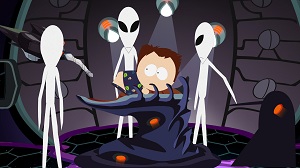 Essentially, the plot is an excuse for a Greatest Hits tour through South Park that pulls characters and references from the length and breadth of the show’s seventeen year (As Mr. Slave would say: Jesus Christ) history, wrapped up in an RPG system taking equal inspiration from Earthbound and the Paper Mario games – something apparently requested by Parker and Stone, who are fans of those games. It’s no secret that they are big gamers, with the subject coming up often in the show. Here, however, they finally get the chance to go full-bore on the industry and they make sure to leave no trope unpoked. This is something that often comes across as disingenuous when developers attempt it, but a complete blast when put in the hands of Oscar-nominated comedy writers who themselves have a love of games, and have both an intimate knowledge of the medium’s soft spots and zero compunctions about prodding them (All I’m saying is: Best Nazi zombies ever).
Essentially, the plot is an excuse for a Greatest Hits tour through South Park that pulls characters and references from the length and breadth of the show’s seventeen year (As Mr. Slave would say: Jesus Christ) history, wrapped up in an RPG system taking equal inspiration from Earthbound and the Paper Mario games – something apparently requested by Parker and Stone, who are fans of those games. It’s no secret that they are big gamers, with the subject coming up often in the show. Here, however, they finally get the chance to go full-bore on the industry and they make sure to leave no trope unpoked. This is something that often comes across as disingenuous when developers attempt it, but a complete blast when put in the hands of Oscar-nominated comedy writers who themselves have a love of games, and have both an intimate knowledge of the medium’s soft spots and zero compunctions about prodding them (All I’m saying is: Best Nazi zombies ever).
This backed up with a surprisingly strong set of RPG mechanics that are simple to use but provide a fair amount of room for experimentation. Combat in particular is great fun, with attack options basically breaking down into three categories: weapon attacks, that can bolstered with patches that give buff and damage type modifiers, ‘magic’ (i.e. fart) attacks, and PP-fuelled special attacks. Your powers are determined by the class you choose at the top of the game, the selections being Fighter, Mage, Thief and the dreidel and circumcision razor-packing Jew. You also get a companion to roll with, who can be changed at any time based on who you’re allied with. They come with their own attacks and skills that can be used to solve several fairly straightforward environmental puzzles throughout the game.
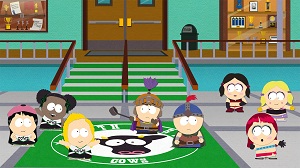 The combat is turn-based but you’re always flush with options, and the ability to change party members at any point allows you to adjust to foes on the fly. It’s not particularly challenging, with most enemies being fairly quick and easy to beat, but remains enjoyable and funny, and is balanced in a way that when you do come across heftier enemies you have room to experiment. Character development owes a fair bit to Diablo, with loot providing stat buffs and further enhancement coming from patches and ‘strap-ons’ (The equivalent of Diablo‘s socketable gems) and levelling and accruing Facebook friends awarding special attack upgrades and perks respectively.
The combat is turn-based but you’re always flush with options, and the ability to change party members at any point allows you to adjust to foes on the fly. It’s not particularly challenging, with most enemies being fairly quick and easy to beat, but remains enjoyable and funny, and is balanced in a way that when you do come across heftier enemies you have room to experiment. Character development owes a fair bit to Diablo, with loot providing stat buffs and further enhancement coming from patches and ‘strap-ons’ (The equivalent of Diablo‘s socketable gems) and levelling and accruing Facebook friends awarding special attack upgrades and perks respectively.
It’s a system that doesn’t call too much attention to itself, happy to take a backseat to the consistently hilarious writing, but keeps the game enjoyable on a mechanical level throughout. While considerably shorter than what we tend to expect from modern RPGs (Steam clocked my playthrough at sixteen hours) it’s immaculately paced, never feeling truncated or drawn out at any stage. The show’s brisk pace is one of the principal secrets to its success, and it’s extremely impressive to see the same feel so effectively translated to a 10-hour-plus game. Some may balk at the comparative shortness, but in the context of the subject matter it’s perfectly paced, long enough to work as an RPG but compact enough to accommodate a narrative that is packed to the gills with jokes, characters and references while pushing the plot to the ridiculous extremes Parker and Stone do so well, without pace-breaking stretching out. If only every game could have me grinning like an idiot for sixteen hours straight.
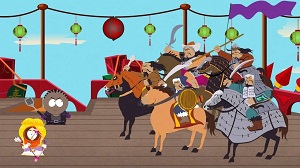 What’s more, the game moves with impressive smoothness with very little in the way of jank or awkwardness. I didn’t experience any bugs (Who are these developers and what have they done with Obsidian?) though tying the save system to the checkpoints isn’t always ideal; there’s one early boss that requires a good couple of minutes’ busywork in preparation that has to be repeated on each reload, which can get annoying if you need several attempts to beat it. Also, while the game absolutely nails the show’s construction paper aesthetic, genuinely making you feel like you’re controlling an extended episode, its flatness this can lead to objects obscuring smaller paths in the environment, bringing about the odd head-scratching moment when navigating the town.
What’s more, the game moves with impressive smoothness with very little in the way of jank or awkwardness. I didn’t experience any bugs (Who are these developers and what have they done with Obsidian?) though tying the save system to the checkpoints isn’t always ideal; there’s one early boss that requires a good couple of minutes’ busywork in preparation that has to be repeated on each reload, which can get annoying if you need several attempts to beat it. Also, while the game absolutely nails the show’s construction paper aesthetic, genuinely making you feel like you’re controlling an extended episode, its flatness this can lead to objects obscuring smaller paths in the environment, bringing about the odd head-scratching moment when navigating the town.
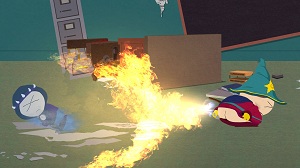 Ultimately, however, these are far from game-breaking faults and are quickly forgotten when you’re having this much pure fun. It’s evident how much cultural cache the show and its massive cast of characters has attained when running into them and the many references to to show’s history is such a joyful experience. It goes without saying that there’s not a lot here for those who don’t like the show and/or its style of humour; but then again, that really doesn’t need explaining, does it? But for everyone else, I dare anyone to brood about the game’s length once they get reacquainted with the Visitors, Al Gore or the Underpants Gnomes, or summon Jesus into battle for the first time. If you like South Park even a little bit, this game is your catnip.
Ultimately, however, these are far from game-breaking faults and are quickly forgotten when you’re having this much pure fun. It’s evident how much cultural cache the show and its massive cast of characters has attained when running into them and the many references to to show’s history is such a joyful experience. It goes without saying that there’s not a lot here for those who don’t like the show and/or its style of humour; but then again, that really doesn’t need explaining, does it? But for everyone else, I dare anyone to brood about the game’s length once they get reacquainted with the Visitors, Al Gore or the Underpants Gnomes, or summon Jesus into battle for the first time. If you like South Park even a little bit, this game is your catnip.
However, this leads us to the catch in this whole deal. Unfortunately – if not surprisingly – TSOT is also the latest game to be hit with the stick of censorship, with Ubisoft implementing a frankly baffling system of cuts resulting from what has been described as a ‘marketing decision’, the likely intention being to dodge regional classification problems. The cut material involves two minigames (One taking place in an abortion clinic and the other involving Randy and an anal probe) and the removal of swastikas in the Germany/Austria version as per German law. It breaks down like so:
- U.S./ROW: All formats completely uncensored;
- Germany, Austria: All formats with censored swastikas/Nazi salutes, Consoles w/ censored minigames and Randy scenes;
- Australia: All formats censored (Minigames and Randy scenes);
- Rest of Europe: Console versions censored, PC completely uncensored.
Clear as mud, then. The bottom line is, depending on your format and/or region you should be prepared for special censor screens devised by Parker and Stone for these scenes describing what you should be seeing. Having played the uncensored version, I can assure you that the first minigames are eminently missable, and while the Randy scenes are funny, they’re extremely short and far from the funniest material in the game. In total, you’ll be missing maybe a couple of minutes’ worth of material, none of which is the game at its best.
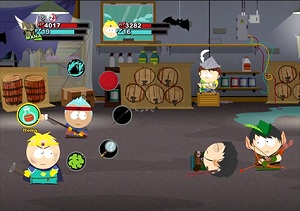 Having said that, however, this doesn’t address the wider issue, with many gamers already sick of being treated like children and wanting a choice in the media they consume. Publishers censoring games before the ratings boards even get involved sets an awful precedent that will only encourage more of this behaviour, and arrest gaming’s development into a mature form of entertainment at a time when there is real progress there to be potentially lost, and it’s something that reviewers are going to need to consider when scoring games.
Having said that, however, this doesn’t address the wider issue, with many gamers already sick of being treated like children and wanting a choice in the media they consume. Publishers censoring games before the ratings boards even get involved sets an awful precedent that will only encourage more of this behaviour, and arrest gaming’s development into a mature form of entertainment at a time when there is real progress there to be potentially lost, and it’s something that reviewers are going to need to consider when scoring games.
Thankfully, in this case the cuts are minor enough that they don’t at all diminish Parker/Stone/Obsidian’s work (Apart from flying in the face of South Park‘s spirit) or the fun of playing the game. At a time when games arrive dissected for later sale as DLC or microtransactions, or bloated and meandering with gameplay that ignores the natural pace and/or tone of their own stories, it’s a downright relief to see a game come along that knows its own material, knows what it wants to do and does it with confidence, cohesion and a sense of pace. The Stick of Truth isn’t just a good licensed game, a rarity in itself, but just as strong an example as last year’s acclaimed Brothers: A Tale of two Sons of how much creators from other media can bring to games when there is focus and a shared artistic vision.
No, I wasn’t expecting that comparison either.
Rating: 




Out of a Possible 5 Stars
